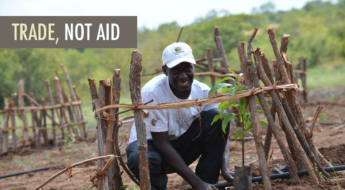Hunger

“People are starving in Africa.” How many times have you heard this from your mom or dad when you were younger as they tried to persuade you to take just one more bite of that broccoli casserole? Your parent’s reasoning was that you should finish all the food on your plate because so many go daily without anything. We were told that countless Africans would love to get their hands on our leftover carrots and peas. So, we reluctantly swallowed our vegetables, all the while, developing a mindset that there must be some pretty hungry people on the dark continent.
In our travels throughout the villages of Zambia, we’ve seen countless people without the bare necessities of life. It’s gets especially hard when we come across malnourished children. We want to help them all and we often try. But our best efforts always come up short because there’s simply too many affected.
This need hasn’t gone unnoticed by the world. Organizations like the United Nations Development Programme, Wold Vision and Mary’s Meals have been targeting this issue in Zambia for years! And they’re doing good. Just recently we saw one of these groups go through many of the schools in our area, building kitchens and providing meals for the students. Their one meal a day at school is more sometimes than they receive at home.
However, with all the time and effort that so many have put into addressing this issue, why has very little changed long-term? People are still hungry in Africa. Children are still very malnourished. Big organizations still give and provide. But what’s the solution and why aren’t we gaining ground?
The problem isn’t the economy because we’re talking about farmers who have lived off the land for generations. This wouldn’t explain why so many are without what they need to survive! We can’t even point our finger at global warming. While new programs to introduce conservation farming are beneficial, even this solution isn’t the answer.
Surprisingly, months before the time of hunger hits, the grain stores for everyone in the village are full and life is good. There’s no thought of hunger and everyone is well fed. There is often enough harvest to nourish the family for a full 12 months.
Then I saw the real issue.
Many of the men would take large amounts from their abundant harvest and trade it in at a fraction of the value to gamble, drink and live promiscuously. This is done on such a large scale in the village. I was shocked. The notion to save for later in the year and provide nourishment for their children isn’t even a consideration. The general lifestyle is a “live for today” mentality.
Because of this, any foreign subsidies without a complete life change on the receiver is only enabling bad tendencies. The solution to the real issue is addressing the heart of man and not merely his physical condition. However, in restoring one’s relationship with God, his condition will greatly improve as well. This is one of the benefits of doing things God’s way. Ultimately, one comes to Christ because they acknowledge their guilt before God and their need for redemption. This spiritual restoration makes men better fathers and husbands. It transforms women to be better wives and mothers. Children are guided on a better path that introduces them to God and improves their standing with those in their communities.
It’s amazing how developing communities that are influenced by missionaries following God’s principles are more advanced in commerce, education, health and academics. When a society is built on truths from God’s Word, it’s naturally going to flourish. Our own country is a good example of that.
So as we tackle the issue of fighting hunger and malnutrition, we have to take all of this into account. Reform and education can only take a person so far when there’s innumerable, negative influences in their life. An inward change has to happen before one’s outlook and actions can be affected in a positive way.
.
.










Leave a Comment